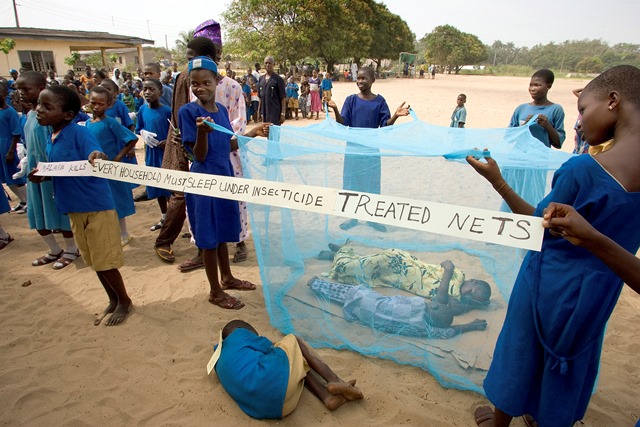World Malaria Day: Nigeria Left Out Of WHO-Backed Malaria Vaccine Pilot Projects
Nigeria awaits malaria vaccine disbursement, which will begin in 2023, despite accounting for 31.9 per cent of malaria related deaths globally. The vaccine has been piloted in Ghana, Kenya, and Malawi.

Over 1 million children in Ghana, Kenya, and Malawi have reportedly received one or more doses of the world’s first malaria vaccine through an intervention backed by the World Health Organisation (WHO).
This leaves Nigeria, which accounts for 27 per cent of malaria cases globally, out of this intervention.
In a statement released by the WHO, the RTS,S/AS01 (RTS,S) –a recombinant protein-based malaria vaccine– has been safe and feasible, and has also substantially reduced the severity of malaria in target countries, especially in children of five to 17 months.
The RTS,S, trade named ‘Mosquirix’, is the world’s first malaria vaccine that acts against the Plasmodium Falciparum, the deadliest malaria parasite globally and the most prevalent in Africa.
In Jan. 2016, the vaccine was recommended by WHO for pilot introduction in selected areas of Ghana, Kenya, and Malawi to learn more about the public health value of the vaccine in real-life routine immunisation settings.
The Ministries of Health in the three countries led the malaria vaccine pilots. This was followed by a consortium of in-country evaluation partners generating the data and evidence used to inform the WHO recommendation.
Why Nigeria was not part of this intervention
Prof. Wellington Oyibo, the Director Centre for Malaria Diagnosis, Research, Capacity Building and Policy, University of Lagos, said in an interview that health facilities and systems were lacking for clinical trials of the vaccine to be carried out in Nigeria.
“There are important health systems and infrastructure that should be in place but are not on ground. However, nothing stops the country from negotiating these opportunities. We have our lessons learned and I am confident the country will do better,” he said.
The criteria for choosing the three countries were: high coverage of long-lasting insecticidal-treated nets (LLINs), well-functioning malaria and immunisation programmes, a high malaria burden despite scale-up of LLINs, and participation in the Phase III clinical trial.
Oyibo said that he was worried that clinical trials were not even attempted in Nigeria but the Prince Ned Nwoko Foundation has gotten approval from the Ministry of Health to acquire the vaccine in Nigeria. He, however, admitted that the malaria vaccine alone cannot help the country reach zero malaria cases by 2030.
World Malaria Day
World Malaria Day is commemorated annually on April 25 to focus global attention on malaria, and its devastating impact on families, communities and societal development, especially in Sub-Saharan Africa.
According to Dr Matshido Moeti, the WHO Regional Director for Africa, this year’s theme, “Harness innovation to reduce the malaria disease burden and save lives”, aligns with the call to urgently scale up innovation, and the deployment of new tools in the fight against malaria.
“Despite some slowing of progress to reduce malaria cases and deaths, and the disruptions to health services caused by COVID-19, we are still much further ahead than we were in 2000. We need to reignite that momentum, and build on the recent advances,” Moeti said.
In 2021, Nigeria had the highest number of malaria cases than any country in the WHO African region as well as accounted for 31.9 per cent of global deaths from malaria. It is also reported that the country loses over N645.7 billion yearly to prevention and treatment of the disease as well as other costs.
Support Our Journalism
There are millions of ordinary people affected by conflict in Africa whose stories are missing in the mainstream media. HumAngle is determined to tell those challenging and under-reported stories, hoping that the people impacted by these conflicts will find the safety and security they deserve.
To ensure that we continue to provide public service coverage, we have a small favour to ask you. We want you to be part of our journalistic endeavour by contributing a token to us.
Your donation will further promote a robust, free, and independent media.
Donate HereStay Closer To The Stories That Matter




